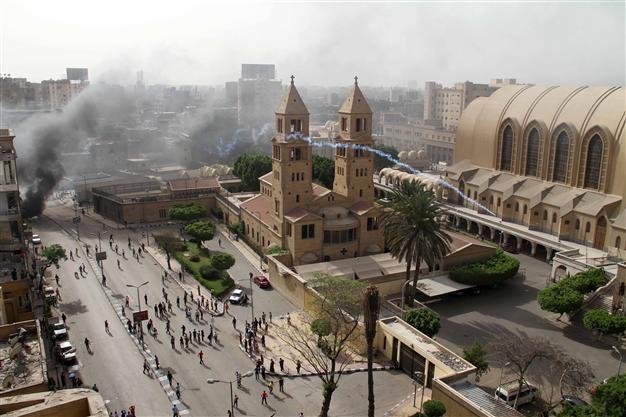One dead in clashes after funeral of Egypt Coptic Christians
CAIRO - Agence France-Presse

A tear gas canister is fired by Egyptian riot police into the compound of the Coptic Orthodox Cathedral after the funeral of four Christians killed in sectarian clashes near Cairo over the weekend in Cairo, Egypt, April 7. AP photo
One person died April 7 in clashes at Cairo's Coptic cathedral after funeral prayers for four Christians during which angry Copts chanted against President Mohamed Morsi, an official said.
Fighting between Christians and Muslims meanwhile erupted anew late Sunday in a town north of Cairo where sectarian violence had killed five people two days earlier, police said.
The bitter clashes underscore the simmering tensions in a divided Egypt that has seen violent confrontations between Morsi's main Islamist allies and a wide ranging opposition.
Witnesses to the Cairo clashes said they began when mourners were pelted with stones by residents of the area as they left the cathedral, symbol of the Coptic community which has long complained of discrimination and marginalisation.
Black-clad riot police intervened, firing tear gas at the cathedral, witnesses said, but not before one person had been killed.
"There is one fatality in (Cairo's) Demerdash hospital," health ministry official Ahmed al-Ansari told AFP. Hani Sobhi, a young Copt, explained that live television coverage of the funeral service had been the spark for the latest violence.
"Inside the cathedral we chanted 'down with the Brotherhood rule' and that was aired live on television. At the exit (of the cathedral) the people were ready and waiting for us," he said.
There were scenes of chaos outside the cathedral in the central Cairo neighbourhood of Abbassiya where Coptic bishops had been calling for peace and calm after the killing of the Christians on Friday.
Loud blasts could be heard, as clouds of smoke rose up into the sky and people ran in several directions.
Rows of Abbassiya residents hurled rocks and bottles at the cathedral and were met in kind from Copts inside the church complex.
The mourners had been planning to carry the bodies of the Christians out of the cathedral to the presidential palace as a protest against the violence, one of them said.
"There were tensions with police and the residents of the area were hostile to us and sided with the police," another Christian, Sami Adli, told AFP.
"They were running after Christians. Police fired tear gas at the seat of the Pope. What kind of state allows such a thing? The Copts won't let this pass," said a very emotional Adli.
Another Copt, Michel Lamii who emerged from the scene wiping his eyes, said dozens of people were affected by tear gas inside the cathedral.
"The government wants this. The only solution is for the army to intervene," said a man in his 50s who did not give his name. A group of volunteers arrived at the church with medical supplies, an AFP reporter said.
In a statement, the interior ministry said "a number of mourners began to damage cars in the area which led to confrontations with residents of the area." Sunday's service was being held for four Christians killed in sectarian clashes on April 5. One Muslim was also killed in the violence which flared in Al-Khusus, a poor area in Qalyubia governorate, after a Muslim in his 50s objected to children drawing a swastika on a religious institute.
The man insulted Christians and the cross, and an argument broke out with a young Christian man who was passing by, escalating into a gunbattle between Muslims and Christians in which assault rifles were used.
The incident sparked rioting during which a church was partially burnt and a Christian's home torched, while a pharmacy owned by a Copt was ransacked.
Christians form between six and 10 percent of Egypt's population of nearly 83 million people. The country's Coptic Christians and Muslims have clashed on several occasions since the revolution that toppled former president Hosni Mubarak in February 2011.
